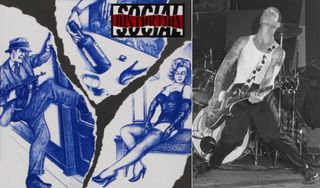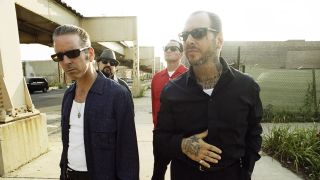We don’t always take the time to look at every album and accomplishment that the band has made over the years, but one of the main reasons why we’re commemorating the self-titled record is that it was such a pivotal point in our career. It was a couple of years after [1988 album] ‘Prison Bound’, which got us a little bit of recognition, and it came at a time when I was really trying to carve out our own niche and sound. I was listening to a lot of early American music, so writing songs like ‘Sick Boys’, ‘Ball And Chain’ and ‘Story Of My Life’; they weren’t your typical punk songs, but I felt that because they were about real life that that was punk, since punk is about being real. And there’s nothing more real than real life. Occasionally when the punk rock police come around and criticise the songs for not being punk enough or whatever, I always say, ‘Well maybe you should listen to the lyrics to ‘Ball And Chain’,’ because it’s about hard living and getting through to the other side.
When the record first came out it started getting a lot of attention and some good feedback, and that gave me a lot of confidence in myself and my songwriting abilities. What’s been interesting is typically we never play any albums in their entirety, or sequence, or either really. I sequence a record a lot differently to the way I do a live show, but once we did it once I realised it actually works really well. It’s high energy – and they’re a great collection of songs to play. And being in the process of writing a new record right now, it’s been really nice to go back and revisit all of the songs, because I don’t usually go back and listen to my own music. Sometimes I’ll be in the middle of one of the songs and I’ll go, ‘What was I thinking here? This is a really interesting arrangement.’ So it’s been neat to revisit that song writing aspect of it as well. And then touring it has given the fans a completely different show.
Musically speaking, I think Social Distortion is a great outline and a blueprint of our sound. I feel like the record that followed it, Somewhere Between Heaven And Hell, was an organic progression that went even further into American roots music. And then I wrote White Light, White Heat, White Trash and that was a bit different but still recalled elements of Social Distrotion. So I’m definitely very fond of the record. And making it was the first time we worked with a proper producer, who’s name was Dave Jerden, and he was cool because he kind of just let us do our thing. The budget wasn’t huge, but it was much bigger than what we were used to and it was nice to work with good equipment and recording gear.

**The artwork for Social Distortion’s self-titled album, and right, Ness in 1989 **Photo: Joe Hughes/Michael Ochs Archives/Getty Images
When you go in to make a record you have to go in with the mindset that you’re making the record of your career, otherwise there’s no point. So you really have to set the standards high. And there’s a lot of self-imposed pressure that comes with that. But it raises the bar immediately. You have to have a whole trashcan full of crumbled up ideas – going, ‘This is shit… this is shit… this is shit.’ – to get to the good stuff. The self-titled album was a valuable experience for me in that way. I had no idea how successful the album would be though. It went gold, and back then that was a lot of records. I didn’t see that coming.
When I was writing the last record (Hard Times and Nursery Rhymes) I didn’t want to get pigeonholed into only writing autobiographically about my life. I thought, ‘maybe people are getting fucking bored hearing about all this shit’. So I went back to character writing mode, and it was so liberating because the minute I took myself out of the song it became fun to write again. And songs like Sweet & Lowdown and Machine Gun Blues are still about me; I’m imagining what it would be like if I was in that situation. It’s just fun to get a little bit more poetic and creative sometimes. And people want that when they listen to music. Music is an escape. They don’t always want to hear about this one person’s life, or indeed their own personal life, which is why they’ll sing along to Story Of My Life as if it really is about them too.
The bulk of my writing is based on my own experiences, and you can trace that all the way back to the self-titled album and the ones before it. I don’t try to write about anything that I don’t know about. I just try to create things that I dig, and then I put them out there and hope that other people dig it too. Writing politically is challenging for me. I try to be politically aware, and I try to be politically active, but for some reason when I try to write topically or politically it just loses something, so it may not be my bag. I’m interested in the darker side of life; crime, sins, and passion. They’re the things that stimulate me.
I was 28 when I wrote the songs for Social Distortion, so I was still very young and immature. But I was also learning to become a man, and although I never wanted to become a preacher I was trying to make people think about where a certain lifestyle leads. Take a song like Drug Train. For years I wondered, ‘Well how come Johnny Thunders can do it and I can’t?’ And then of course, he died. They all die eventually. And I’m glad I didn’t die. But when I do, I don’t want to leave with any regrets. Now that rolls a lot more into my personal life than my professional one, but I’d just like people that I’ve encountered on both sides to think that I’m a good man. If they were going to write anything on my tombstone I’d want them to write, ‘That fucking Mike Ness, man. He was a good guy.’ That’s how I’d like to be remembered.”
Mike Ness was speaking to Matt Stocks.

